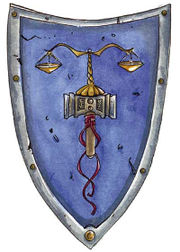Tyr
Name(s): Tyr, God of Courage and Strategy
Status: Intermediate Deity
Symbol: Scale on top of a Warhammer
Home Plane: Ysgard
Alignment: Lawful neutral
Portfolio: Courage, trust, strategy, tactics, writing, Justice
Worshipers: Fighters, Monks, Paladins, Rangers, Sages, Dwarves
Clerical alignments: LE, LG, LN
Domains: Law, Protection, War
Favored Weapon: Longsword
One of Odin's sons by Frigga, Tyr appears as a powerful-looking bearded man who has lost his right hand. He is considered the most senior Aesir after Odin and Thor, and the most courageous of the gods. He wields great power in battle, and like his father can dictate the outcome. Wise warriors invoke Tyr before entering battle. Tyr's life is tangled up with monstrous wolves. He lost his right hand to Fenrir while the gods bound the son of Loki.
Tyr's cult teaches courage in everyday situations as well as in catastrophes or in battle. This is the courage of those who know their capabilities, not the courage of foolhardiness. Tyr's cult understands the value of self-sacrifice, but differentiates between necessity and throwing one's life away. The cult teaches sacrifice for others as an ideal, while holding sacrifice for personal glory as anathema. Because of the cult's focus on sacrifice for others, it is welcomed in all but the most chaotic communities.
Tyr's clergy work to develop their skills fighting with a weapon in their left hand, if they're not already left-handed. When conducting their religious duties, they generally wear a closed leather sleeve over their right arm and hand in emulation of their deity. While they're often warm, understanding, and encouraging, their patience has limits. Those who refuse to face life with courage have only so long to change before Tyr's clergy leaves them to suffer the fate of their choices. Tyr's temples are tightly organized fortresses with duty rosters and ceremony schedules posted for all to read. They contain armories and training halls, and may own fields where they can train locals in formation fighting and maneuver. Visitors to Tyr's temples find the schedule will not bend to their needs. Those who actively support the schedule and organization find themselves welcomed. The clergy does not tolerate sloth, disorganization, or chaotic traits.
